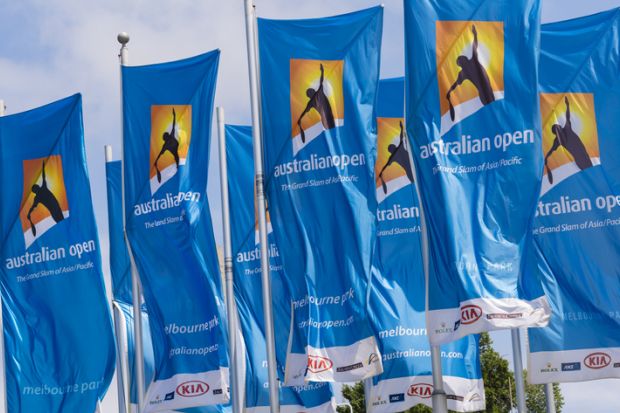At today’s final of the Australian Open tennis championship, the stadium may be full, but the court will still look oddly empty. The absence of the world number one and nine-time former champion, Novak Djokovic, has left a void that continues to make more headlines than the tournament itself.
Djokovic, of course, had his Australian visa controversially revoked after he was initially granted an exemption from the normal Covid vaccination rules; it seemed to an angry public that tennis officialdom became so keen for the unvaccinated Serb to feature in the tournament that they played fast and loose with the rules.
Exactly what risk Djokovic might have posed, having apparently had Covid recently, could be volleyed back and forth forever – particularly given the recently emerged doubts about the timing of his case. But perhaps the real public health risk was a popular backlash against vaccine mandates if an elite athlete who appears to ignore practically every piece of scientific advice nevertheless went on to win a record-breaking 21st grand slam.
Djokovic is not the only celebrity vaccine sceptic. Hollywood superstars Robert De Niro, Charlie Sheen and Jim Carrey have also publicly spoken out. So too has the American podcaster Joe Rogan – prompting the musicians Neil Young and Joni Mitchell to remove their music from the platform that hosts his podcasts.
Of course, for every flaky celebrity with eccentric views on vaccination, there has been an army of academic talking heads to counter them. But did any of them look as fit and healthy as Novak Djokovic? Or attract the same loyal following? A recent study found significant positive associations between anti-vaccination attitudes and celebrity admiration and interest. In Serbia, where Djokovic is a national hero, it is estimated that under half the population is fully vaccinated against Covid.
US psychologist Lynn McCutcheon, a co-author of the study, suggests that most celebrity admiration is harmless and related to our natural need for entertainment. However, she adds that some people who lack meaningful relationships, or maybe even a robust sense of personal identity, may exhibit addictive attitudes towards celebrities, even leading to obsession.
Another of McCutcheon’s studies finds that celebrity worship in the US has risen dramatically since 2001 – likely related to increased access to information about celebrities on social media. And a further study she was involved with finds that admiration for celebrities is associated with lower general and intellectual humility.
Research also indicates that humility is essential to gaining new knowledge. All teaching requires students to have the humility to realise they have something to learn (it has been found to be associated with better course grades, for instance). Intellectual humility is the sweet spot between the extremes of intellectual arrogance and intellectual servitude; intellectually humble yet bookish people understand and accept that their cerebral faculties are not perfect, so their understandings may, at times, be prone to error.
But intellectual humility may be subtly discouraged through social pressures to have all the answers; saying: “I don’t know” makes one appear stupid or incompetent. But it isn’t just students and celebrities who can succumb to a lack of intellectual humility. To what extent did the various academic virology or epidemiology experts who became media celebrities during the pandemic move from humility towards intellectual arrogance as they grew to enjoy the limelight? After all, neither the media nor the public had much appetite for experts who said they needed more data or emphasised what vast unknowns there always are.
According to BBC News, Djokovic has clarified his declared opposition to vaccines by conceding that he is "no expert" and would keep an "open mind". But he wanted to have "an option to choose what's best for my body". The subtext remains: how dare any medic profess to know better than the superstar athlete himself what is best for his body?
Today, it seems that everyone believes themselves to be an expert – their expertise arising out of their “lived experience”. But if education hinges on the notion of ignorance, where does this leave universities?
Perhaps no one cares. If a university degree has basically become no more than a ticket to a job, the issue of what it is to obtain a genuine education becomes forgotten. Yet even businesses require intellectual humility – and the most successful ones recognise this. As former Google senior vice-president Laszlo Bock described it: “The people who are the most successful here…will have a fierce position. They'll argue like hell…But then you say: ‘Here's a new fact’ and they'll go: ‘Oh, well, that changes things; you're right.’”
Universities need to fight more fiercely for intellectual humility, promulgating it as an essential part of our wider intellectual culture. This is the essential antidote to the insidious influence of celebrity vacuity. However, aping such fallacious certainty on the media circuit can only end in game, set, match and championship to the anti-vaxxers.
Raj Persaud is a consultant psychiatrist in private practice in Harley Street, London, and author of The Mental Vaccine for Covid-19 (Amberley Press, 2021). Adrian Furnham is an adjunct professor in psychology at the BI Norwegian Business School in Oslo and the co-author of The Psychology of Spies and Spying, published in February by Troubadour.
Register to continue
Why register?
- Registration is free and only takes a moment
- Once registered, you can read 3 articles a month
- Sign up for our newsletter
Subscribe
Or subscribe for unlimited access to:
- Unlimited access to news, views, insights & reviews
- Digital editions
- Digital access to THE’s university and college rankings analysis
Already registered or a current subscriber? Login








